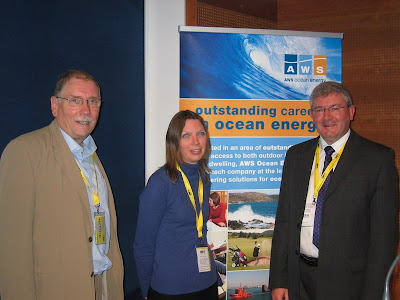On the back of yesterday’s meeting of Eurozone ministers and the UK in Paris I did up a short briefing setting out what actions the EU has taken in the context of the current global financial crisis. I thought an overview of what is happening in Brussels might be helpful.
Role of the EU in the current financial crisis
The EU position remains one of encouraging and brokering inter-governmental coordination in the face of the crisis. While the European Central Bank (ECB) has a role to play in injecting liquidity into the EU financial markets, it has a limited role to play in managing the crisis. The ECB has no role in national measures designed to nationalise (or otherwise bail-out) domestic banks and other financial institutions (mortgage companies).
Nonetheless what has been striking so far has been the lack of any co-ordinated European response to a Europe-wide failure of financial deregulation.
Euro area summit, Paris
Leaders of the eurozone and the UK meeting in Paris agreed a joint European action plan to rescue Europe’s banks. The action plan simply asserts the existence of a shared concern and the need for member states to work together in the context of this financial crisis.
The action plan outlines guiding principles for government intervention through a number of national measures, which are aimed at:
- Ensuring sufficient liquidity for financial institutions (banks and lenders)
- Facilitating the financing of banks ("which is currently constrained") whereby until the end of next year national governments can offer guarantees for new inter-bank loans of up to 5 years. The form of the guarantee may vary from country to country.
- Providing the financial institutions with capital resources so that they can appropriately finance the economy
- Providing a sufficient recapitalisation of distressed banks
- Ensuring enough flexibility in the implementation of the accounting rules in the current exceptional circumstances
- Enhancing cooperation procedures between European countries.
The rescue plan, which all eurozone members are to implement according to their own national conditions and needs, will only apply until 31 December 2009
European Council, 15-16 October 2008
It is expected that EU leaders will reaffirm the co-ordinated approach to tackling the financial crisis that was agreed at the Eurozone summit in Paris.
The draft conclusions of the European Council of 15 and 16 October express the resolve of the heads of state and government "to take concerted and integrated action to protect the European financial system".
The European Council notes that national decisions must take account of their impact on other member states and be in keeping with the common principles laid down by the European Council. The heads of state insist that "measures to support banks in difficulty should go hand in hand with measures to protect tax payers, to secure accountability on the part of executives and shareholders and to protect the legitimate interests of other market players".
Due to the "exceptional circumstances," the EU rules must be enforced swiftly and flexibly. Financial establishments must implement "recommendations on the transparency of their commitments and risks" in a credible way.
EU Finance ministers meeting 7 October 2008
EU Finance Ministers agreed at their meeting in Luxembourg to "take all necessary measures to enhance the soundness and stability of our banking system and to protect the deposits of individual savers”. The Finance Ministers concluded that "public intervention has to be decided at national level in a coordinated framework”.
They agreed on seven principles of government action in bank rescues:
(1) any support given should be timely,(2) temporary taxpayers’ interests must be protected, (3) existing shareholders should bear the consequences of government intervention, (4) governments must be free to change bank managements, if necessary, (5)governments must have the power to change banks’ remuneration policies, (6) EU state aid rules must be respected to ensure a level playing field for competitors and (7) there must be no negative spillover effects on other EU countries
EU Financial Action taken by the European Commission
Publication of Commission Communication on state aid guidelines 13 October
The Commission published guidance on how member states can best support their financial institutions in the current financial crisis while respecting EU state aid rules and avoiding excessive distortion of competition, e.g. by discriminating against financial institutions based in other Member States or allowing beneficiary banks to unfairly attract new additional business solely as a result of government support. The measures must be limited in time and foresee adequate contributions from the private sector.
The Commission relaxed its state aid rules to enable member states support their financial institutions through their various proposed bail-out schemes.
However, the Commission is clear that while seeking to approve rescue measures for banks very quickly (within 24 hours if possible) "such measures may not result in unnecessary distortions of competition between financial institutions operating in the market or negative spillover effects on other member states".
The Commission guaranteed that national rescue plans would be given the go-ahead within 24 hours if they meet the requirements outlined in its new state aid guidelines.
Appearing before the European Parliament's Economic and Monetary Affairs Committee on 6 October, EU Competition Commissioner Neelie Kroes stated that EU competition rules were "part of the solution" to the banking crisis.
The restructuring and recovery plan for banks had to respect state aid rules. These rules "are a means of ensuring a common framework, even when governments must act at national level," she said. Unilateral action was not the way forward. Ignoring state aid rules would tempt governments into a subsidy race, with healthy companies being put out of business just because their competitors received unfair state subsidies".
Governments will have to ensure that every bank active on their territory will gain access to the rescue measures, regardless of nationality. This was one of the main arguments raised by the Commission against Ireland's rescue scheme presented two weeks ago.
In its original plan, Ireland issued a blanket guarantee for all deposits in six Irish banks, but the scheme excluded other institutions operating in the country, favouring a massive reallocation of funds towards the protected banks, mainly from UK financial institutions. The Commission was particularly concerned about the discriminatory potential this could cause within the Irish market as well as its effect on other EU countries' banks.
The revised Irish plan does not include such discrimination and was formally approved by the Commission on Monday.
The Commission has already approved plans by some Member States to restore liquidity and confidence within 24 hours of their notification - e.g. the UK and Ireland on 13 October, which were found to be compatible with EC state aid rules under Article 87.3(b).
Proposal for increasing minimum protection for bank deposits
The Commission published a proposal on Wednesday 15 October to increase the minimum amount of state-guaranteed savings in any one bank from €20,000 to €50,000. This is supposed to reassure us that our savings in European banks are safe and to discourage people taking money out of their accounts to put it in banks in countries they think offer better protection. The Commission may decide to increase this to €100,000 before the end of the year. Belgium, Cyprus, Spain, Lithuania and Portugal have already increased their national guaranteed savings to €100,000. Other Member States, like Germany, Austria and Slovakia, have pledged to guarantee all savings.
Capital Requirements for banks
At the beginning of October, the Commission presented proposals for reviewing the capital requirements for banks, which included plans for more coordinated European supervision based on colleges of supervisors. Under these proposals all multinational groups will have ad hoc colleges of supervisors, put together from the authorities of the countries in which the company operates, but it remains unclear how the power will be shared.





